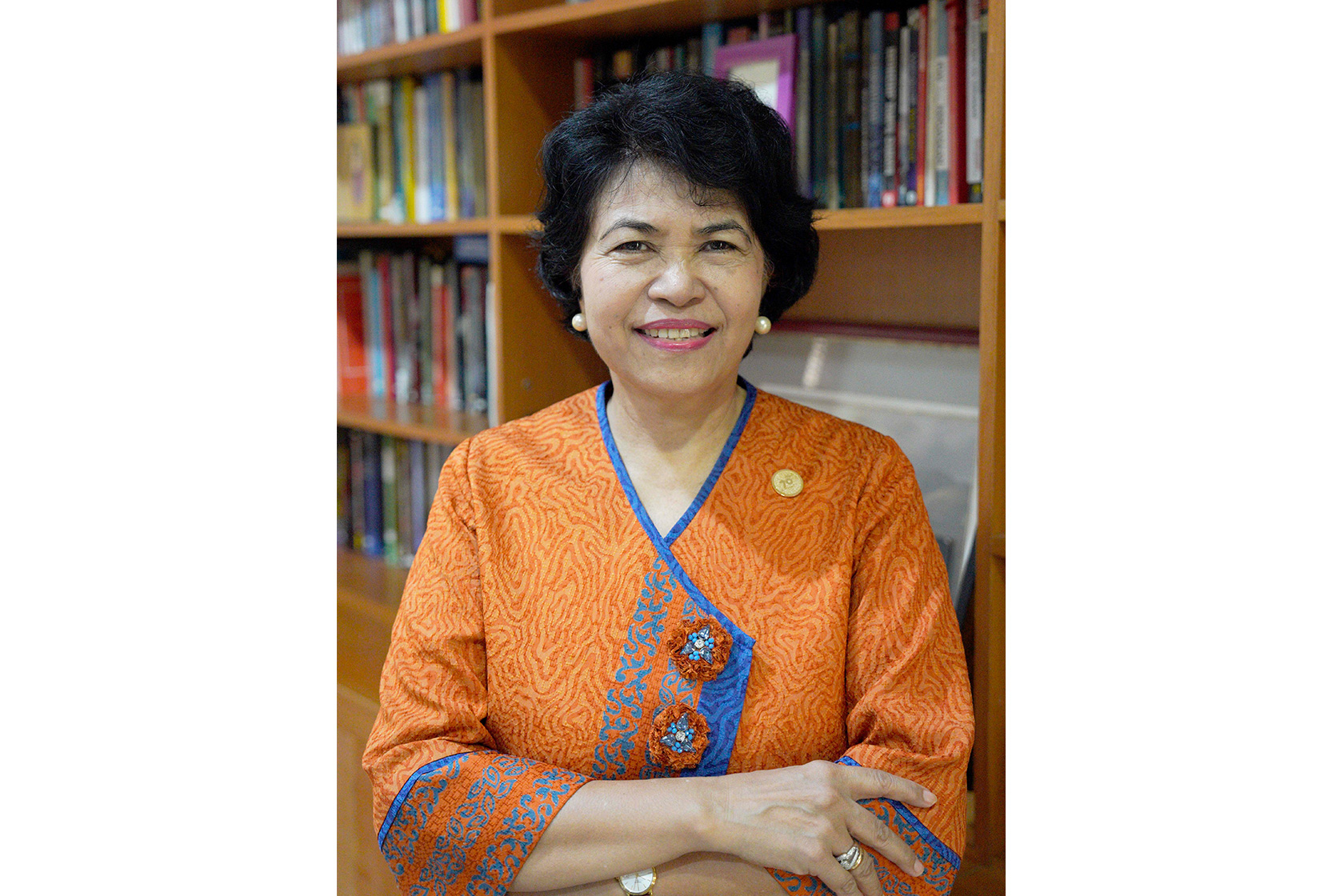
23 July 2024
Enhancing Hepatitis Case Reporting in Puskesmas through Data Interoperability: Dr Lady Sirait's Initiatives
The Indonesian Ministry of Health defines digital health transformation as the changes within health... Read More
The Australia Awards are prestigious, transformational scholarships and short courses offered to emerging leaders for study, research and professional development in Australia

13 Dec 2023
 Professor Dewi Fortuna Anwar Builds Greater Insight into Indonesia’s Role in the Region and the World
Professor Dewi Fortuna Anwar Builds Greater Insight into Indonesia’s Role in the Region and the World
The growing public awareness of the Association of South East Asian Nations (ASEAN) in global politics and economics can be attributed to the persistent work of trailblazing researchers such as Professor Dewi Fortuna Anwar.
From its modest inception in 1967 as a group of young nations, the majority of which had only recently gained independence from centuries of colonisation, ASEAN has developed into a regional powerhouse that provides platforms for collaboration between its member nations and dialogue partners.
Prof Dewi has diligently followed and studied the 10-member ASEAN since the 1980s, long before many experts recognised the importance of the group. Her decades-long research, be it published in scholarly publications or newspaper op-eds, has helped to bring the relevance of ASEAN to the attention of the international community and the wider public.
The significance of ASEAN was evident at this year's ASEAN Summit in September, which was hosted by Indonesia with the theme, "ASEAN Matters: The Epicentrum of Growth." A flurry of meetings with international partners resulted in various cooperation commitments in areas from the digital economy and security to the energy transition.
“ASEAN Matters can be understood in two ways,” explained Prof Dewi, a Research Professor at the Research Centre for Politics at the National Research and Innovation Agency (BRIN). “First, ASEAN does matter both internally among the ASEAN states and externally in the role of ASEAN in managing relations with other powers, be it in the Indo-Pacific region or the global community.
“ASEAN Matters also means issues relating to ASEAN,” she said, adding that two unresolved issues are the South China Sea and political turmoil in Myanmar.
ASEAN now has various collaboration platforms, including ASEAN+3, a forum for economic cooperation with China, Japan, and the Republic of Korea, as well as the ASEAN-Indo Pacific Forum.
Indonesia’s Role in ASEAN
According to Prof Dewi, the evolution of ASEAN over decades cannot be isolated from Indonesia's leadership, which extends beyond the rotating presidency. When Indonesia assumes the chairmanship, which alternates annually among members, it produces something substantial.
For example, the first ASEAN Summit in 1976 in Bali delivered the important Treaty of Amity and Cooperation (TAC), which acts as the region's code of conduct. In 2019, Indonesia gathered Indo-Pacific countries as dialogue partners to support ASEAN's position.
“Indonesia is the one that has taken the initiative and is a champion for it. So we expect that Indonesia will continue to provide intellectual leadership and push for the different areas of practical cooperation, even though Indonesia will no longer be the chair of ASEAN next year,” she said.
From a Passion for History to the Study of ASEAN
Prof Dewi frequently participates in discussions to share her extensive knowledge of both ASEAN and Indonesian foreign affairs. Her compact but insightful explanation, peppered with humour, can capture listeners' attention, even those not well-informed on foreign affairs.
While Prof Dewi writes and researches contemporary issues, her lifelong passion is history, which she discovered while attending secondary school in London.
“I remember the history teacher, especially the one who taught European history. She made history come to life. So, I have always been very interested in history. I love reading historical novels,” she recalled.
It was only natural that she chose history as her major at the University of London School of Oriental and African Studies (SOAS), where she earned a Bachelor of Arts degree in 1981 and a Master of Arts degree in South East Asian Area Studies in 1982.
After completing her master's degree, Prof Dewi returned to Indonesia and joined the prestigious Indonesian Sciences Institute (LIPI), now BRIN, in March 1984. When she started working at LIPI, the institution had just begun showing interest in ASEAN.
Therefore, Prof Dewi concentrated her research on Indonesia and ASEAN when she was offered a PhD program at Monash University's Departments of Politics and History in the late 1980s.
"ASEAN was a significant regional organisation, but there had been little research on the group and why Indonesia became involved in ASEAN. At the time, no one had really studied that too deeply, and I felt like I had gaps to fill," recalled Prof Dewi, whose thesis was titled, "ASEAN as an aspect of Indonesian foreign policy."
Professor Herbert Feith, a renowned expert on Indonesian politics, co-supervised Prof Dewi's PhD thesis at Monash. When she paid an unofficial visit to Monash in 2016, she fondly remembered Prof Feith as a wonderful and inspiring teacher.
While completing her PhD, Prof Dewi was offered a scholarship from Monash University and the Australian Government. However, she chose the Monash scholarship because it gave her more flexibility to care for her family and study.
At that time, Prof Dewi was married with a child, and her husband, who worked at an international oil company, had to move to Lhokseumawe in Aceh Province.
“I was able to stay two years in the field. I travelled to do my fieldwork in ASEAN countries and started to draft my thesis when living in Lhokseumawe,” she said.
A Foundation for Lifelong Learning
Since graduating from Monash in 1990, Prof Dewi's career has consistently advanced. In 1998, she obtained the title of Principal Research Expert; in 2006, she was appointed Research Professor. She was LIPI’s Deputy Social Sciences and Humanities Chairperson from 2001 to 2010.
Prof Dewi was also involved in numerous research projects, including as a Distinguished Visiting Professor at Johns Hopkins University’s School of Advanced International Studies (SAIS) in 2007, a Distinguished Visiting Fellow at Kyoto University’s Center for Southeast Asian Studies (CSEAS) in 2010.
More recently, from August 2017 to July 2018, she was a Distinguished Visiting Professor at the Nanyang Technological University’s S. Rajaratnam School of International Studies (RSIS) in Singapore.
Studying in Australia, she said, allowed her to polish her research expertise in her field.
“The study gives you two things. First, the substance itself. I became an expert in the area that I study. That is a strong foundation for future studies because I can always refer to the materials I got from my research,” she said.
“The second is how to study the knowledge, gather information, collate information, organise the information, and become a knowledge producer. It's lifelong learning.”
The Importance of International Relations
In the late 1990s, Prof Dewi began working in the government while continuing to work as a researcher. From May 1998 to October 1999, she served as a spokeswoman for President BJ Habibie and the Assistant Minister of the State Secretariat for Foreign Affairs.
She served as Vice President Boediono's Deputy Secretary for Political Affairs from October 2010 to May 2015. From May 2015 to February 2017, she worked as the Deputy for Government Policy Support under Vice President Jusuf Kalla.
In 2017, after 18 years as a bureaucrat advising vice presidents, Prof Dewi returned to academia as a full-time research professor at BRIN.
At BRIN, she works in the foreign policy research cluster, focusing on research on Indo-Pacific issues. Her team has just completed a survey on how high-ranking government officials view the Indo-Pacific.
“I have several research papers that I need to write until the end of this year as well as next year,” she said.
Prof Dewi continues to attend seminars and workshops and deliver lectures on topics such as Indonesian foreign policy, ASEAN, and ASEAN's relationship with world powers, to name a few.
She hopes her research can inform the public well-informed about Indonesia’s foreign policy and international relations.
“I hope I can make the wider public understand the importance of international relations, why foreign policy is important, and our position,” she said.
But most importantly, she hopes that policymakers can also learn from the evidence-based perspectives scholars and researchers provide.
“We hope that policymakers will not simply make policy based on instinct,” Prof Dewi stated. “They should make policy based on evidence and some understanding about the wider issues, not just by gut feeling.”
Share this article on:
 Related Article
Related ArticleThis website uses cookies to improve your website experience. We may also use cookies to analyse website data so that we can improve our online services. To find out more visit our privacy policy.

